It’s a new academic year, and five fresh faces are coming to Rutgers Linguistics! Join us in giving a warm welcome to our department’s new cohort of graduate students. Read on: they’ve each sent us a little introduction for us to get to know them better.
Welcome!!!
Thương (Beryl) Bùi
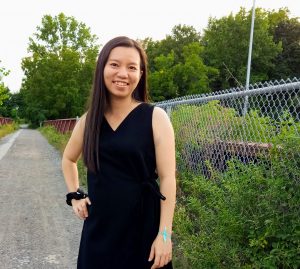 Hi, I’m Beryl. Beryl (a kind of precious stone) is the English word for my Vietnamese name Thủy Thương [tʰwi˧˩˨ tʰɯəŋ˦] – one of the twelve building materials of the New Jerusalem in the Bible. I come from a small, quiet town in Mekong delta, Vietnam. It is home to many tropical fruits, especially dragon fruits, rambutans, guavas, jackfruits, etc. I was surrounded by a lot of teachers in my childhood: my parents and a lot of my uncles, aunts, in-laws, and cousins were/are teachers. After graduating from Vietnam National University (VNU) in Ho Chi Minh city, I also chose the teaching career like them.
Hi, I’m Beryl. Beryl (a kind of precious stone) is the English word for my Vietnamese name Thủy Thương [tʰwi˧˩˨ tʰɯəŋ˦] – one of the twelve building materials of the New Jerusalem in the Bible. I come from a small, quiet town in Mekong delta, Vietnam. It is home to many tropical fruits, especially dragon fruits, rambutans, guavas, jackfruits, etc. I was surrounded by a lot of teachers in my childhood: my parents and a lot of my uncles, aunts, in-laws, and cousins were/are teachers. After graduating from Vietnam National University (VNU) in Ho Chi Minh city, I also chose the teaching career like them.
I received my first MA degree in TESOL (Teaching English to Speakers of Other Languages) from VNU. After a few years’ teaching English, I met my Super Mentor, Prof. Héctor Campos, who introduced generative syntax to me. He opened a whole new horizon to me, helping me realize that the syntax programs used in VNU as well as many other universities in Ho Chi Minh city are so outdated. Prof. Campos gave me not only the passion for syntax, but also the thirst for formal training in linguistics, especially in syntax. I wanted to go to America – the cradle of modern linguistics – not only to update my knowledge but also to learn how to teach linguistics. I went to University of Rochester for the second MA degree in linguistics under the Fulbright scholarship. My graduation essay was on shifted anaphors in Vietnamese. I’m also interested in other syntactic topics in my mother tongue such as passive voice, negation, etc.
My two passions are teaching and linguistics, and I combine them in my syntax clubs and YouTube podcasts. The clubs are free-of-charge syntax courses that I offer to my Vietnamese students, both inside and outside VNU. I also post linguistics lectures on my YouTube channel, B’s Ling Corner, for Vietnamese students.
In my non-academic life, I spend a lot of time cooking and baking both to release stress and to take care of my loved ones. I usually invite people over for meals or share food with them. Giving other people good food is the best way to our love and care for them. I can’t wait to invite my Rutgers friends over for hot bowls of phở [fə˧˩˨] (Vietnamese beef noodle) and other traditional Vietnamese food!
Vinny Czarnecki
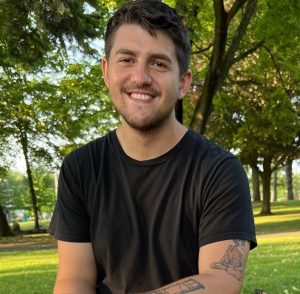 Hello, my name is Vinny Czarnecki!
Hello, my name is Vinny Czarnecki!
I was born and raised on Long Island, NY, which is luckily not too far of a train ride from New Brunswick. When I’m not doing linguistics related stuff, you can find me occupying my time by playing/listening to music, cooking, working out, running, skateboarding, or collecting books. For the past couple of years I have been playing guitar in two bands with some very close friends of mine. I’d definitely say that belting out at practice or a show after a long week is one of my favorite ways to relieve stress.
I started my undergraduate degree pursuing electrical and computer engineering because my dream was originally to design guitar amplifiers. While I was pursuing my degree I realized how much more passionate I was about mathematics than engineering, so I decided to change my major. When I changed my major I discovered that I needed to fulfill a language requirement so I took Russian. From there I realized how systematic and similar to math language is, which was the first trigger for my interest in linguistics. I ended up taking as many linguistics classes as I could before graduating and then applied to an MA program in computational linguistics. Since then I knew I wanted to do my own research in mathematical and computational linguistics. So needless to say I am ecstatic about starting my PhD at Rutgers!
My research interests lie in the intersection of linguistics, mathematics, theoretical cs, and philosophy. I feel that there are both new and old ideas in these other fields that on the surface are seemingly unrelated to natural language, but are actually perfectly suited for answering our questions as linguists. Right now I find myself most interested in computational syntax. In my MA final project I discussed some of the computational requirements for implementing sideward movement using tree automata. More specifically, I showed why multi bottom-up transducers can cover some ordinary cases of movement like wh-movement, but cannot cover sideward movement since they are not able to take movers to non-c-commanding positions. I think this was an interesting example of how some seemingly unrelated concept used in theoretical computer science (tree walking pebble automata used in XML/database theory) can be applied to solving a problem in natural language syntax! While I’ve previously focused more on syntax, I’m very excited to branch into other areas. Regardless of the domain, I want to use mathematical ideas to understand and answer questions about the complexity, processing, and learning of human language. I hope that one day such understanding could be used to inform NLP models so that they more closely reflect what the human mind does.
Aidan Sharma
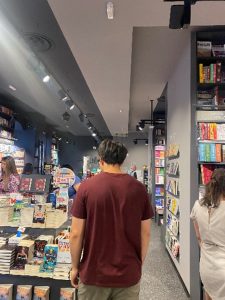 Hi everyone, I’m Aidan. I’m from a small town in northeast PA and went to high school just across the border in Upstate NY. There’s nothing particularly interesting about this part of the country that I can think of, but conveniently for me it’s not too far from New Brunswick. I watch a lot of football and soccer along with some tennis and like to play soccer when I can. My other hobbies include abstract board games, Nintendo games (particularly Pokémon), and buying books I probably won’t read. Recently, I’ve been buying translations of the first Harry Potter book in languages I have varying levels of knowledge of. So far, this includes Гарри Поттер и философский камень (Russian), Хәрри Поттер мен пәлсапа тас (Kazakh), and Hari Poter i Kamen mudrosti (Serbian).
Hi everyone, I’m Aidan. I’m from a small town in northeast PA and went to high school just across the border in Upstate NY. There’s nothing particularly interesting about this part of the country that I can think of, but conveniently for me it’s not too far from New Brunswick. I watch a lot of football and soccer along with some tennis and like to play soccer when I can. My other hobbies include abstract board games, Nintendo games (particularly Pokémon), and buying books I probably won’t read. Recently, I’ve been buying translations of the first Harry Potter book in languages I have varying levels of knowledge of. So far, this includes Гарри Поттер и философский камень (Russian), Хәрри Поттер мен пәлсапа тас (Kazakh), and Hari Poter i Kamen mudrosti (Serbian).
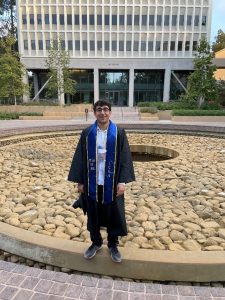 I did my undergrad at UCLA where I was a math major and a linguistics minor. I got into linguistics in a somewhat roundabout way, as it seems most people do. I came to UCLA as a mechanical engineer because I didn’t know much about how college worked and that sounded like something I could get a job with. Almost immediately I realized I was much more interested in math than the other classes I was taking and changed my major. My primary interest in math was logic, and luckily UCLA had plenty of logic courses in both the math and philosophy departments. In a second bit of luck, UCLA had a foreign language requirement and changing my phone to Spanish over the summer wasn’t enough to test out of it. I ended up taking Russian and liking it so much that I continued to take it for the rest of college. After having taken a year of Russian, a Serbian friend of mine said between my knowledge one Slavic language and her help, learning Serbian should be no problem, and so I took Serbian for the next two years. Around this time, a few people who knew my schedule mentioned that people with similar interests usually ended up in linguistics. From there, it was a pretty straight-forward path to studying semantics. I’ve maintained an interest in Slavic linguistics, but I’m primarily interested in things like modality, evidentiality, quantifiers, and propositional attitudes, and I’m looking forward to exploring these topics further at Rutgers.
I did my undergrad at UCLA where I was a math major and a linguistics minor. I got into linguistics in a somewhat roundabout way, as it seems most people do. I came to UCLA as a mechanical engineer because I didn’t know much about how college worked and that sounded like something I could get a job with. Almost immediately I realized I was much more interested in math than the other classes I was taking and changed my major. My primary interest in math was logic, and luckily UCLA had plenty of logic courses in both the math and philosophy departments. In a second bit of luck, UCLA had a foreign language requirement and changing my phone to Spanish over the summer wasn’t enough to test out of it. I ended up taking Russian and liking it so much that I continued to take it for the rest of college. After having taken a year of Russian, a Serbian friend of mine said between my knowledge one Slavic language and her help, learning Serbian should be no problem, and so I took Serbian for the next two years. Around this time, a few people who knew my schedule mentioned that people with similar interests usually ended up in linguistics. From there, it was a pretty straight-forward path to studying semantics. I’ve maintained an interest in Slavic linguistics, but I’m primarily interested in things like modality, evidentiality, quantifiers, and propositional attitudes, and I’m looking forward to exploring these topics further at Rutgers.
Chenli Wang
 Hi! My name is Chenli Wang, and I’m an incoming graduate student to the Linguistics Department.
Hi! My name is Chenli Wang, and I’m an incoming graduate student to the Linguistics Department.
I majored in Psychology for my bachelor’s and master’s degree. In my sophomore year of college, I took an introductory psycholinguistics course that changed my perception of how humans acquire language. Like many people, I had taken for granted that language is a skill we naturally possess as human beings. We do not realize how valuable and difficult language is to acquire because we learn our native language seemingly so effortlessly. Starting from that time, I accumulated experience in the field of language processing, and gradually developed an interest in the cognitive processes underlying the acquisition of a second language. I am interested broadly in investigating what are the differences between first and second language processing using methods such as eye-tracking to get time-sensitive measures of online language processing.
I feel excited and nervous at the same time joining the Linguistic Department at Rutgers. I did not have much training in formal linguistics, but I hope I will transition smoothly!
In my non-academic life, I love watching TV series, and doing makeup. I have a whole makeup collection (I believe weighed more than 100 pounds) which I happily carried all the way from Madison, WI to Urbana, IL and all the way here!
Ariela Lu Ye
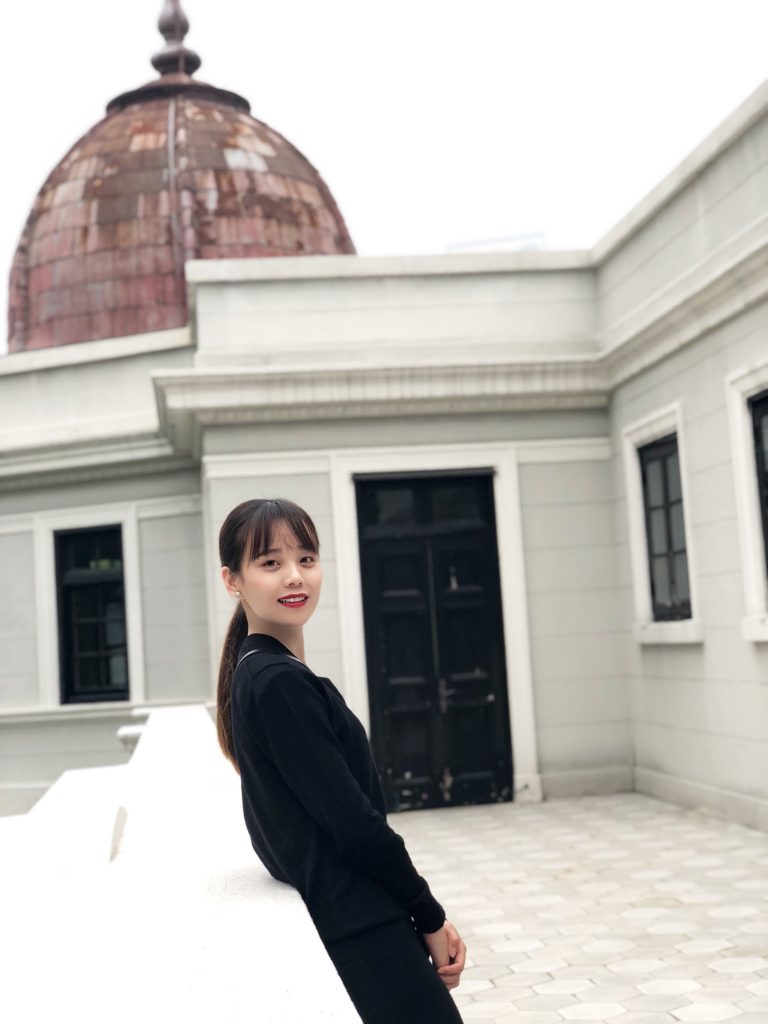 Hi, everybody!
Hi, everybody!
I am Ariela Lu Ye from China. I obtained my B.A. from Beijing Language and Culture University with English as my major and Teaching Chinese as A Foreign Language as my minor. The four-year studies led me to have tasted into the mystery of logic and linguistics that eventually made semantics my coveted field of study. Then I moved to Shanghai to do my M.A. in linguistics at Fudan University. During my MA studies, I was rewarded with intriguing semantic jewels hidden in daily humdrum, which motivated me to move to USC for PhD studies. And then finally, I decided to transfer to Rutgers. Sounds like a twist and turn but I do enjoy every single experience.
Outside of academia, I like hiking, swimming, practising calligraphy and playing the Ukulele (just a beginner’s level for this musical instrument :). I’m also a fitness fanatic and we can go to the gym together if you like!
I am really looking forward to meeting you all in person at Rutgers!
Once again, a big welcome to our new first years! We’re all looking forward to meeting you in the coming semester and learning more about you and your work.